featured
Feds Accuse State-Licensed Marijuana Farm Of Employing Minors, As White House Dismisses Criticism Of Raid
Published
19 hours agoon
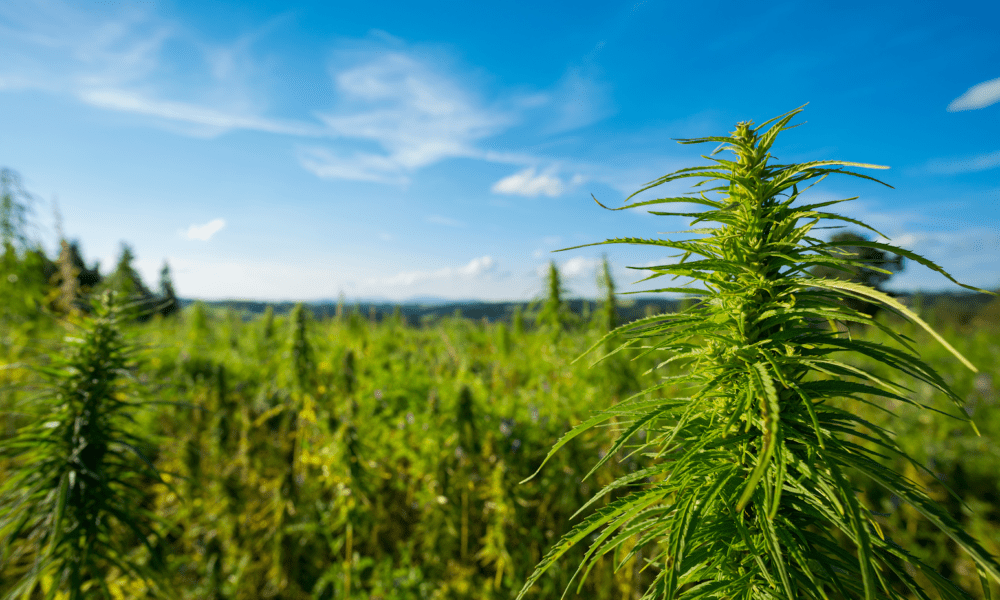
The U.S. Department of Homeland Security is accusing a California marijuana business of employing minors at a grow facility that Immigration and Customs Enforcement (ICE) raided on Thursday—an allegation the state-licensed operator is denying following the enforcement action.
And the White House is now dismissing criticism of the ICE raid, downplaying the consequence of the action because workers were involved in cannabis “product” as opposed to legitimate “produce.”
Following media reports of the raid at two farms operated by Glass House Brands Inc.—and criticism from Gov. Gavin Newsom (D) of broader immigration enforcement actions across the state—DHS and Customs and Border Protection (CBP) responded on social media, leveling accusations of child labor.
“Why are there children working at a marijuana facility, Gavin?” DHS said on X.
The department also posted a meme, saying, “Unaccompanied migrant children shouldn’t be forced into labor at California marijuana facilities.”
CBP Commissioner Rodney Scott said that “10 juveniles were found at this marijuana facility—all illegal aliens, 8 of them unaccompanied.
The matter is “now under investigation for child labor violations,” he said.
Here’s some breaking news: 10 juveniles were found at this marijuana facility – all illegal aliens, 8 of them unaccompanied. It’s now under investigation for child labor violations.
This is Newsom’s California. https://t.co/Z1XoRMtBSN
— CBP Commissioner Rodney Scott (@CBPCommissioner) July 11, 2025
Marijuana Moment reached out to Glass House for comment about the federal claims, but a representative did not respond by the time of publication.
The White House, meanwhile, shared a dismissive post about the raids, contrasting marijuana “product” with “produce” as justification for the enforcement operations in response to a Democratic congressman’s claim that the administration is “targeting the immigrant farm workers who feed America.”
“ICE: Raids marijuana farms filled with illegal aliens,” the White House’s official X account posted on Friday.
“Cryin’ Jimmy: “ThEy’Re JuSt StRaWbErRy PiCkErS 😭,” it said, referencing criticism of the raids by Rep. Jimmy Gomez (D-CA). “That ain’t produce, holmes. THAT’S PRODUCT. 🌿”
Glass House, for its part, reacted to the DHS allegations by saying it “received immigration and naturalization warrants,” and consistent with law, “we verified that the warrants were valid and we complied.”
“Workers were detained and we are assisting to provide them legal representation,” the company said. “Glass House has never knowingly violated applicable hiring practices and does not and has never employed minors.”
Yesterday, Glass House Brands received immigration and naturalization warrants. As per the law, we verified that the warrants were valid and we complied.
Workers were detained and we are assisting to provide them legal representation.
Glass House has never knowingly violated…
— Glass House Brands Inc. (@GlassHouseBR) July 11, 2025
“We do not expect this to affect operations moving forward,” it said. “We will provide additional details when applicable.”
Graham Farrar, president of Glass House, added that he acknowledges that there are “lots of questions” and “we have a lot of them too.”
“Our team has been continually on site and we are focused on taking care of our people and our plants,” he said.
Know there are lots of questions, we have a lot of them too, as we get more information we will update.
Our team has been continually on site and we are focused on taking care of our people and our plants. $GLASF https://t.co/O0UULhtlcK
— Graham Farrar (@grahamfarrar) July 11, 2025
The White House’s rapid response team, meanwhile, offered their own perspective.
“It’s a marijuana facility. What will we do without illegals to pick our weed?” it said, calling an advocacy journalist who posted a video of the raid a “moron.”
While ICE has been conducting raids in jurisdictions across the state and country, without explicitly targeting state-legal cannabis businesses, President Donald Trump’s deputy assistant, Alex Pfeiffer, did seem to indicate that the administration views marijuana farms are less legitimate as far as the agriculture economy is concerned.
“This is a marijuana facility,” he said. “The growth of OG Kush is not the backbone of our food chain.”
The assistant secretary of DHS, Tricia McLaughlin, said DHS “law enforcement is executing criminal search warrants at a marijuana facility,” adding that the department’s “brave officers will continue to enforce the law.”
Echoing that point, U.S. Attorney Bill Essayli said federal agents were “executing a search warrant at this marijuana farm,” and agents “have already arrested multiple individuals for impeding this operation and will continue to make arrests.”
“Don’t interfere. You will be arrested and charged with a federal offense,” he said.
Federal agents are executing a search warrant at this marijuana farm. Agents have already arrested multiple individuals for impeding this operation and will continue to make arrests. Don’t interfere. You will be arrested and charged with a federal offense. https://t.co/KMwZ5WToOc
— U.S. Attorney Bill Essayli (@USAttyEssayli) July 11, 2025
Prior to DHS’s allegations about the reasoning behind the raid, California Department of Cannabis Control Director Nicole Elliot told Marijuana Moment that the division “understands today’s action has been described as focused on immigration enforcement.”
“We want to remind our licensees: do not let fear and intimidation divide or destabilize your workplace or your community,” she said. “California remains committed to thoughtful, lawful governance and to protecting the integrity of our regulated cannabis market.”
Morgan Fox, political director of NORML, told Marijuana Moment on Friday that, despite the administration’s insistence that it’s prioritizing criminal entities with its immigration policy, it’s evidently “going after licensed agricultural entities,” which “seems like it should be a low priority.”
Several Democratic lawmakers on Capitol Hill weighed in more broadly on the immigration enforcement actions, condemning them as examples of the administration choosing to go after an entire class of people, rather than targeting undocumented individuals who’ve committed serious crimes.
Instead of prioritizing dangerous criminals Trump is targeting families that have been here for years picking our food.
The public outcry and protests are occuring because the American public knows this is wrong. https://t.co/IXnMb0Ewx9— Ruben Gallego (@RubenGallego) July 11, 2025
Certain Republican members, meanwhile, have maintained the narrative that a raid at a marijuana farm is distinct because of its status as a federally illegal drug and, therefore, justified.
“They’re not ‘picking our food,’” Rep. Brandon Gill (R-TX) said, for example. “This is a weed farm.”
Rep. Addison McDowell (R-NC) claimed that “Gavin Newsom wants illegal immigrants working in marijuana fields – many of them minors, likely forced into child labor.”
“Get the kids out of the weed fields,” he said. “Get the illegal immigrants out of the country. LAW AND ORDER.”
Immigration raids have become commonplace in California and jurisdictions across the country, drawing large masses of protestors who have pointed to examples where ICE has detained, arrested and, in some cases, deported people who’ve come to the U.S. without proper documentation.
At the same time, involvement with cannabis—including via employment in the state-legal industry—can have immigration consequences for noncitizens.
—
Marijuana Moment is tracking hundreds of cannabis, psychedelics and drug policy bills in state legislatures and Congress this year. Patreon supporters pledging at least $25/month get access to our interactive maps, charts and hearing calendar so they don’t miss any developments.![]()
Learn more about our marijuana bill tracker and become a supporter on Patreon to get access.
—
Meanwhile, on Monday, the Drug Enforcement Administration (DEA) again notified an agency judge that the marijuana rescheduling process remains stalled under the Trump administration.
U.S. Department of Health and Human Services (HHS) Secretary Robert F. Kennedy Jr. was previously vocal about his support for legalizing cannabis, as well as psychedelics therapy. But during his Senate confirmation process in February, he said that he would defer to DEA on marijuana rescheduling in his new role.
Separately, former Rep. Matt Gaetz (R-FL) was reportedly photographed reviewing a document that appears to be a draft contract to provide services—including “administration-related guidance”—to a firm affiliated with the major marijuana company Trulieve. The visible portion of the document describes a lucrative bonus if a certain “matter resolves,” with an “additional ‘Super Success Fee’” for other “exclusive policy remedies.”
Last month, the former congressman reiterated his own support for rescheduling cannabis—suggesting in an interview with a Florida Republican lawmaker that the GOP could win more of the youth vote by embracing marijuana reform.
Gaetz also said last month that Trump’s endorsement of a Schedule III reclassification was essentially an attempt to shore up support among young voters rather than a sincere reflection of his personal views about cannabis.
A survey conducted by a GOP pollster affiliated with Trump that was released in April found that a majority of Republicans back a variety of cannabis reforms, including rescheduling. And, notably, they’re even more supportive of allowing states to legalize marijuana without federal interference compared to the average voter.
Meanwhile, Trump picked former Florida Attorney General Pam Bondi (R) to run DOJ, and the Senate confirmed that choice. During her confirmation hearings, Bondi declined to say how she planned to navigate key marijuana policy issues. And as state attorney general, she opposed efforts to legalize medical cannabis.
Amid the stalled marijuana rescheduling process that’s carried over from the last presidential administration, congressional researchers recently reiterated that lawmakers could enact the reform themselves with “greater speed and flexibility” if they so choose, while potentially avoiding judicial challenges.
Meanwhile, a newly formed coalition of professional athletes and entertainers, led by retired boxer Mike Tyson, sent a letter to Trump on Friday—thanking him for past clemency actions while emphasizing the opportunity he has to best former President Joe Biden by rescheduling marijuana, expanding pardons and freeing up banking services for licensed cannabis businesses.
Photo courtesy of California State Fair.

Author: mscannabiz.com
MScannaBIZ for all you Mississippi Cannabis News and Information.
You may like
-


State senator introduces bill that would legalize recreational marijuana in Pennsylvania
-


Raid on California Marijuana Facility Divides Americans, as Video Shows Migrant Teenager Crying After His Mother Is Detained
-


Agents Clash With Protesters During ICE Raids At Southern California Marijuana Farm | Camarillo | 4K
-
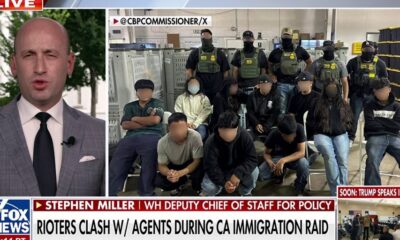

Stephen Miller: Trump admin ‘liberating’ exploited children with marijuana farm ICE raid
-


New study links cannabis use to heart disease risk
-
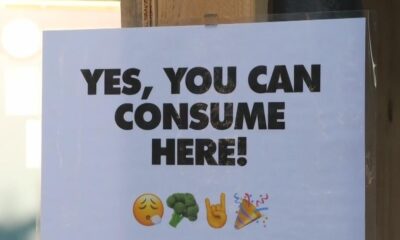

California State Fair’s cannabis use area grows in second year
featured
Today My Cannabis Brand Launches In West Virginia, Where I Spent Years Behind Bars For Growing Medical Marijuana (Op-Ed)
Published
6 hours agoon
July 12, 2025
“Legalization is progress, but we won’t be satisfied until every cannabis prisoner is set free.”
By Ryan Basore, Redemption Cannabis and The Redemption Foundation
A little over a decade ago, I was sitting in a federal prison in Morgantown, West Virginia, serving time for growing medical cannabis in compliance with Michigan’s state law. I wasn’t a trafficker. I wasn’t running guns or laundering money. I was a state-licensed caregiver using cannabis to help people with debilitating conditions. Then I became one of the thousands targeted during a time when the federal government treated medical cannabis providers like public enemies.
Today—July 11—my cannabis brand launches in the same town in which I spent years behind bars for growing medical cannabis.
As traumatic as that experience was, I knew I couldn’t let it deter me from doing what’s right. That’s what led me to found Redemption Cannabis, one of Michigan’s top-selling cannabis brands and one that supports those still serving time for nonviolent cannabis offenses.
Together with partners like Trulieve and Altvm, we provide cannabis products to patients and consumers across states like Michigan, Maryland, Oklahoma, Pennsylvania and now West Virginia, where I once wore prison tans. It’s a redemption story I’m proud of, but it’s also a privilege that too many others have been denied.
Despite widespread legalization across a majority of U.S. states, many in the U.S. remain incarcerated for cannabis offenses. Their “crime”? Often the same actions that built today’s billion-dollar cannabis industry. Legalization has crept forward, but justice has not.
I launched the Redemption Foundation in 2019 to change that. Through our programs, we’ve helped fund over 2,000 free expungements and provided direct financial support to federal cannabis prisoners across the country.
One of our core efforts is our commissary program, which puts up to $300 a month, the maximum allowed, on the books of people incarcerated for non-violent cannabis offenses. For someone earning $14 a month in prison wages, that support isn’t just helpful. It’s life-changing.
We also partner with organizations like the Weldon Project’s Mission Green and the Last Prisoner Project to expand our reach and impact. The goal isn’t just release, it’s restoration. That means helping people return to their communities, access housing, find jobs and reclaim their dignity.
But here’s the hard truth: Unless federal law changes, we will keep seeing these contradictions. The Controlled Substances Act still classifies cannabis as a Schedule I drug, a substance with high risk for abuse with no currently accepted medical use. Until that changes, people will keep getting sentenced, even as legalization spreads.
Even expungement isn’t enough. In many states, it isn’t automatic. People need attorneys, paperwork, court appearances and other resources that are rarely made accessible to them just to be able to live a normal life. They struggle to find work, obtain housing or move on with their lives. Meanwhile, a lucrative industry has emerged around cannabis, the foundations of which were put in place by pioneers who continue to suffer behind bars or remain locked out of the legal industry.
Those of us who now enjoy the ability to consume and profit from legal cannabis owe our freedom to the people who took risks when it wasn’t safe or legal to do so. We have to recognize that our prosperity is a result of their sacrifice.
That’s why 10 percent of all Redemption Cannabis licensing revenue goes to supporting those still incarcerated and to securing their release. When you buy our products, you’re not just consuming, you’re contributing to the pursuit of justice.
Redemption isn’t just our brand name. It’s our mission.
Legalization is progress, but we won’t be satisfied until every cannabis prisoner is set free.
Ryan Basore is the founder of Redemption Cannabis and the Redemption Foundation, which supports cannabis prisoners and fights for restorative justice in the cannabis industry. He previously served a federal sentence for medical marijuana cultivation in Michigan.
Photo courtesy of Chris Wallis // Side Pocket Images.

Author: mscannabiz.com
MScannaBIZ for all you Mississippi Cannabis News and Information.
featured
Texas Governor Calls Hemp Products ‘Lawful Agricultural Commodity’ in Special Session Notice
Published
7 hours agoon
July 12, 2025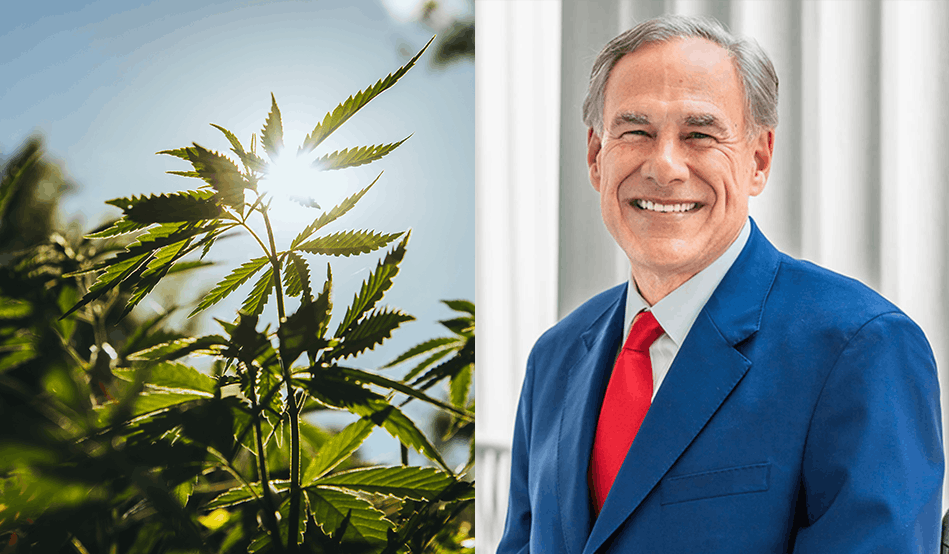
Texas Gov. Greg Abbott doubled down on his stance that hemp-derived products should be regulated, not banned, in the Lone Star State.
Abbott included a pair of hemp-related proposals in his July 9 proclamation submitted to Texas Secretary of State Jane Nelson’s office, calling for a special legislative session to convene at noon on July 21 in Austin.
The chief executive outlined 18 pieces of legislation for lawmakers to consider, from improving early warning systems and other preparedness infrastructure in flood-prone areas to revising the state’s congressional redistricting plan—a move that could protect Republicans’ slim majority in the U.S. House come the 2026 midterm election.
Abbott also called for legislation on hemp proposals that he said would:
- Make it a crime to provide hemp-derived products to children under 21 years of age; and
- Comprehensively regulate hemp-derived products, including limiting potency, restricting synthetically modified compounds, and establishing enforcement mechanisms, all without banning a lawful agricultural commodity.
The July 9 proclamation comes after the governor vetoed Senate Bill 3 on June 22. The legislation would have banned consumable hemp products containing quantifiable amounts of THC or other intoxicating cannabinoids. It was backed by 105 of 108 Republicans in the state’s GOP-controlled Legislature.
In his June 22 veto proclamation, Abbott said S.B. 3 collides with federal law and would likely face a lengthy legal battle before the state could implement and enforce a ban, hindering rather than solving “public safety” issues that lawmakers hope to contain.
“There are many bad actors who have abused the authority granted to them by both the federal government and the state of Texas,” the governor wrote. “But there are also many Texans conducting business responsibly, who invested millions of dollars planting fields or opening up retail stores in reliance on laws making hemp a lawful product to ‘be sold at retail or otherwise introduced into commerce.’”
While Abbott may be the most powerful elected official in Texas, he’s up against a potential showdown with Lt. Gov. Dan Patrick, a fellow Republican who championed S.B. 3 as the presiding officer in the state’s Senate. Following Abbott’s veto, Patrick accused the governor of wanting to “legalize recreational marijuana.”
“This is a fight that didn’t need to be,” Patrick said during a June 23 press conference, when he picked apart the governor’s veto proclamation.
On June 24, two days after Abbott’s veto, the U.S. Court of Appeals for the Eighth Circuit vacated a preliminary injunction that had blocked neighboring Arkansas from implementing a hemp product ban that Gov. Sarah Huckabee Sanders signed into law two years earlier.
While the Eighth Circuit doesn’t encompass Texas, Patrick used that decision as leverage to push back against the governor’s veto.
“It won’t be long before 8,000 smoke and vape shops will be out of business in Texas,” Patrick wrote on X following the circuit court decision. “All we have to do is pass S.B. 3, just like we passed during the regular session.”
Despite the gubernatorial dispute ahead of the special session, the legislative branch will be the ultimate decider on whether to regulate or ban hemp in what has had a $10.3 billion economic impact for the state, employing some 50,000 workers, according to Whitney Economics.
Notably, Texas House members already supported an outright ban on intoxicating hemp products during the regular session on May 21, when they voted, 86-53, to align their version of S.B. 3 with the upper chamber’s version instead of adopting a committee substitute bill that Rep. Ken King, R-Canadian, crafted as the chair of the State Affairs Committee.
King’s substitute would have tightly regulated hemp-derived products instead of banning them.
“Committee substitute to Senate Bill 3 came as a counter option to an outright ban,” King said May 21 on the House floor. “Some of you are for a ban. Many of you aren’t. And that’s the reason we have a choice. How you vote on this amendment [to return the House version to a ban] is completely up to you. I will be voting no on the amendment. And the reason is, I read about the 1920s. I don’t think prohibition worked in 1920; I don’t think it’s going to work in [the] 2020s.”
Ultimately, the Texas House rejected the State Affairs Committee’s alternative bill and then supported S.B. 3’s prohibition language in a 95-44 vote to send the legislation to Abbott’s desk.
While King couldn’t sway his colleagues in the House to support regulation over prohibition, Abbott’s clout as governor remains to be seen in the upcoming special session.
In his June 22 veto message, Abbott offered a sample of 19 “potential” regulations for lawmakers to consider:
- Selling or providing a THC product to a minor must be punishable as a crime;
- Sales must be prohibited near schools, churches, parks, playgrounds and other areas frequented by children;
- Packaging must be child-resistant, tamper-evident, and resealable;
- Products must not be made, packaged, or marketed in a manner attractive to children;
- Any store selling these products must have a permit and restrict access to anyone under the age of 21, with strict penalties for any retailer that fails to comply;
- Products containing THC may not contain other psychoactive substances (e.g., alcohol, tobacco, kratom);
- Testing must be required at every phase of production and manufacturing, including for both plants and derivative consumable products;
- Manufacturing and processing facilities must be subject to permitting and food safety rules;
- Permit and registration fees must suffice to support robust enforcement and testing by the Texas Alcoholic Beverage Commission, in partnership with other state agencies;
- An operator’s permit and warning/danger signs must be posted at any store selling these products;
- Sales must be limited to the hours between 10 a.m. and 9 p.m., and prohibited on Sunday;
- The amount of THC permissible in each product must be restricted, and an individual may make only a limited number of purchases in a given period of time;
- Labels must include a surgeon general-style warning, a clear disclosure of all ingredients, including the THC content, and a scannable barcode or QR code linking to test results;
- Fraudulently creating or displaying manifests or lab results must be punishable as felony offenses;
- Public consumption, consumption on the premises of any store that sells these products, and possession of an open container in a vehicle must be punishable as crimes;
- The attorney general, district attorneys and county attorneys must have the authority to pursue violations under the Deceptive Trade Practices Act;
- Local governments must have the option to prohibit or limit stores selling these products;
- Excise taxes must be assessed on these products to fund oversight and enforcement; and
- Additional funding must be provided to ensure law enforcement has sufficient resources to vigorously enforce restrictions.
“Passing a law is not the same thing as actually solving a problem,” Abbott wrote. “Texas needs a bill that is enforceable and will make our communities safer today, rather than years from now.”

Author: mscannabiz.com
MScannaBIZ for all you Mississippi Cannabis News and Information.
featured
Washington State Government Panel Urges ‘Safe Supply’ Model To Reduce Drug Overdose Deaths
Published
8 hours agoon
July 12, 2025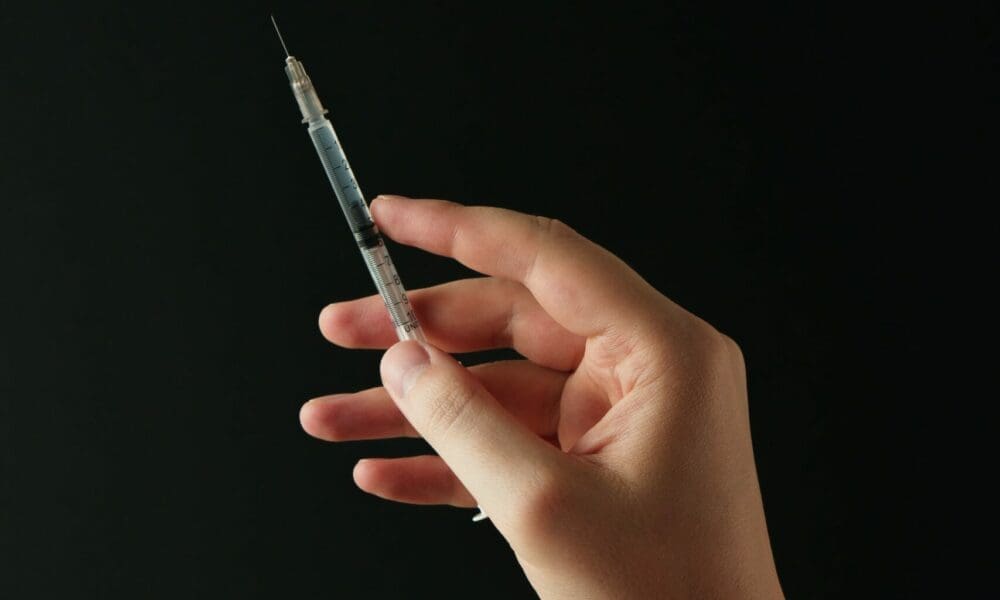
A Washington State government working group is renewing its call for officials to take steps toward ensuring “a regulated, tested supply of controlled substances to individuals at risk of drug overdoses,” pointing to a number of policy options developed in recent years.
Members said in a report that the goals of the safe supply reform are to ensure substances are as safe as possible to consume and to minimize peripheral harms from drug criminalization and incarceration. Changes would also aim to reduce theft, petty crime and syringe litter often associated with illicit drug activity.
The work group presented its safe supply recommendations at a meeting last month, according to The Center Square, but the proposal itself is not new. The state Substance Use Recovery Services Advisory Committee (SURSAC), created through a 2021 law, recommended the following year that lawmakers decriminalize the possession of controlled substances, and the body “has expressed broad support to establish a system to provide safe supply services,” the recommendation report notes.
Four different safe supply frameworks were recommended at 2022 SURSAC special meeting, including prescription and supervised consumption, prescription and self-administration, a dispensary model and a community-based “buyer’s club.”
SURSAC / Washington State Health Care Authority
Republican lawmaker Rep. Travis Couture told The Center Square that he opposes the state taking a role in the safe supply effort, adding that SURSAC seems uninterested in considering other approaches.
“They only want to double down on the failures,” he said, “and what we’re talking about here is taxpayer-funded drug dealing, where the state would hand out heroin, fentanyl and meth on our dime.”
“That’s not treatment,” Couture added, “that’s surrender.”
SURSAC, for its part, wants to see a clinical trial by researchers and a safe supply pilot program enacted by lawmakers.
A subset of Democratic lawmakers did briefly consider the decriminalization of simple drug possession following a 2021 state Supreme Court ruling that struck down Washington’s possession law as unconstitutional. Instead, the legislature chose to recriminalize possession as a lesser charge. And in years since, lawmakers have been more hesitant to advance sweeping reforms such as decriminalization.
As of earlier this year, officials across the state were also still making uneven progress on requirements to vacate thousands of past criminal convictions following the Supreme Court ruling.
In May, a cut to a state budget bill eliminated about $5 million to support legal aid groups working on the clearance effort.
“It’s a gut punch,” Camerina Zorrozua, the legal director and co-founder of The Way to Justice, a nonprofit legal aid organization based in Spokane that has relied on the funding since 2021, told InvestigateWest at the time. “The rug was just pulled out from under us.”
Earlier this year, state Democrats once again also gave up on a plan that would have legalized home cultivation of marijuana for personal use, opting instead to keep the conduct classified as a felony.
—
Marijuana Moment is tracking hundreds of cannabis, psychedelics and drug policy bills in state legislatures and Congress this year. Patreon supporters pledging at least $25/month get access to our interactive maps, charts and hearing calendar so they don’t miss any developments.![]()
Learn more about our marijuana bill tracker and become a supporter on Patreon to get access.
—
If enacted law, HB 1449, from Rep. Shelley Kloba, would have allowed adults 21 and older to grow up to six cannabis plants at home for personal use, with households capped at 15 plants regardless of how many adults reside on the premises. People could also lawfully keep the marijuana produced by those plants despite the state’s existing one-ounce limit on possession.
Kloba and other supportive lawmakers have worked for nearly a decade to pass a law allowing adults to grow a small number of cannabis plants for their own use, but each year, other lawmakers and executive agencies have stood in the way of the proposal.
Image courtesy of Dima Solomin.

Author: mscannabiz.com
MScannaBIZ for all you Mississippi Cannabis News and Information.

State senator introduces bill that would legalize recreational marijuana in Pennsylvania

Raid on California Marijuana Facility Divides Americans, as Video Shows Migrant Teenager Crying After His Mother Is Detained

Agents Clash With Protesters During ICE Raids At Southern California Marijuana Farm | Camarillo | 4K

Stephen Miller: Trump admin ‘liberating’ exploited children with marijuana farm ICE raid

New study links cannabis use to heart disease risk

California State Fair’s cannabis use area grows in second year

Today My Cannabis Brand Launches In West Virginia, Where I Spent Years Behind Bars For Growing Medical Marijuana (Op-Ed)

Multnomah Co. DA, police investigating alleged burglary ring targeting Portland cannabis businesses

Texas Governor Calls Hemp Products ‘Lawful Agricultural Commodity’ in Special Session Notice

Local businessmen launch medical cannabis clinic in Louisville | Wdrb-video

Washington State Government Panel Urges ‘Safe Supply’ Model To Reduce Drug Overdose Deaths
Access Denied

The Best Tips About Hot Tubbing While Stoned

Shocking moment protester ‘opens fire’ on cop during ICE raid at California weed farm as FBI offers $50k for info

Pennsylvania Could Be 25th State to Legalize Adult-Use Cannabis Under New Bill

ICE Raid Turns Violent at Camarillo Cannabis Farm

Bipartisan Congressional Lawmakers Push To Support Psychedelics Research With $10 Million Amendment To Defense Spending Bill

Protesters, federal agents clash after immigration raid on California cannabis farm

US Lawmakers Advance Bill to Ban Hemp Products With THC

Video New study links cannabis use to heart disease risk

What It Means for Cannabis, Labor and Immigration (UPDATED)

Video shows Federal agents throw U.S. citizen to the ground during raid at cannabis farm

Former NFL Star Talks Marijuana Rescheduling With Top Trump Administration Officials At White House Meeting

Protesters clash with agents at ICE raid on Southern California cannabis farm

Alert: Department of Cannabis Control updates data dashboards with full data for 2023

Connecticut Appoints The US’s First Cannabis Ombudsperson – Yes there is a pun in there and I’m Sure Erin Kirk Is Going To Hear It More Than Once!

5 best CBD creams of 2024 by Leafly

Free delta-9 gummies from Bay Smokes

EU initiative begins bid to open access to psychedelic therapies
New Study Analyzes the Effects of THCV, CBD on Weight Loss

Mississippi city official pleads guilty to selling fake CBD products

May 2024 Leafly HighLight: Pink Runtz strain

Curaleaf Start Process Of Getting Their Claws Into The UK’s National Health System – With Former MP (Resigned Today 30/5/24) As The Front Man

5 best autoflower seed banks of 2024 by Leafly

Horn Lake denies cannabis dispensary request to allow sale of drug paraphernalia and Sunday sales | News

Discover New York’s dankest cannabis brands [September 2024]

Local medical cannabis dispensary reacts to MSDH pulling Rapid Analytics License – WLBT

Press Release: CANNRA Calls for Farm Bill to Clarify Existing State Authority to Regulate Hemp Products

Nevada CCB to Accept Applications for Cannabis Establishments in White Pine County – “Only one cultivation and one production license will be awarded in White Pine County”

5 best THC drinks of 2024 by Leafly

6 best CBD gummies of 2024 by Leafly

The Daily Hit: October 2, 2024

5 best delta-9 THC gummies of 2024 by Leafly

Weekly Update: Monday, May 13, 2024 including, New Guide for Renewals & May Board meeting application deadline

People In This State Googled ‘Medical Marijuana’ The Most, Study Shows

Thailand: Pro-cannabis advocates rally ahead of the government’s plan to recriminalize the plant

PRESS RELEASE : Justice Department Submits Proposed Regulation to Reschedule Marijuana

Press Release: May 9, STIIIZY and Healing Urban Barrios hosted an Expungement Clinic & Second Chance Resource Fair
Trending
-

 California Cannabis Updates1 year ago
California Cannabis Updates1 year agoAlert: Department of Cannabis Control updates data dashboards with full data for 2023
-

 Breaking News1 year ago
Breaking News1 year agoConnecticut Appoints The US’s First Cannabis Ombudsperson – Yes there is a pun in there and I’m Sure Erin Kirk Is Going To Hear It More Than Once!
-

 best list12 months ago
best list12 months ago5 best CBD creams of 2024 by Leafly
-

 Bay Smokes1 year ago
Bay Smokes1 year agoFree delta-9 gummies from Bay Smokes
-

 Business10 months ago
Business10 months agoEU initiative begins bid to open access to psychedelic therapies
-

 cbd1 year ago
cbd1 year agoNew Study Analyzes the Effects of THCV, CBD on Weight Loss
-

 Mississippi Cannabis News1 year ago
Mississippi Cannabis News1 year agoMississippi city official pleads guilty to selling fake CBD products
-

 California1 year ago
California1 year agoMay 2024 Leafly HighLight: Pink Runtz strain



